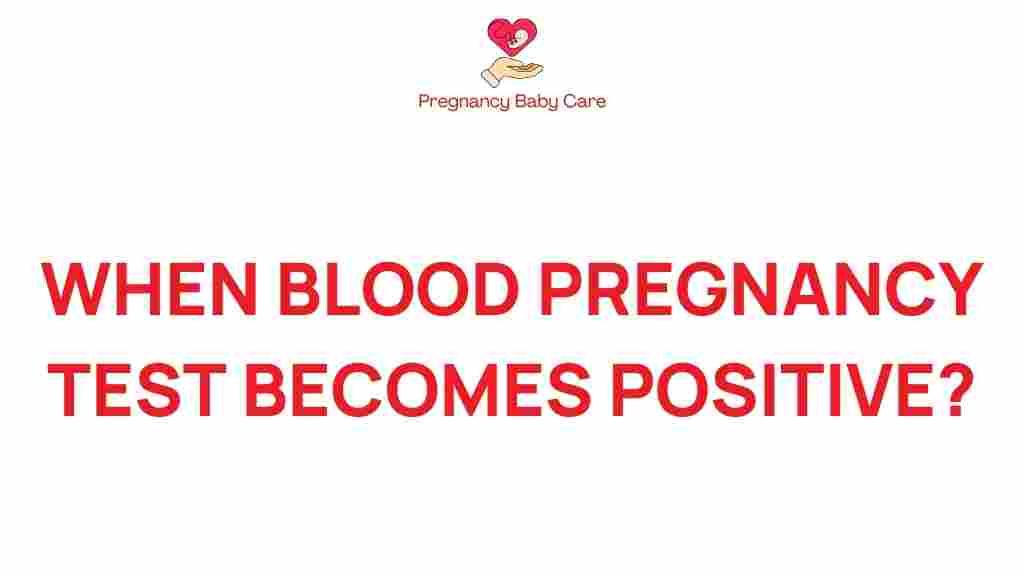Unraveling the Mystery: When Does a Blood Pregnancy Test Turn Positive?
Understanding when a blood pregnancy test turns positive can be crucial for many individuals looking to confirm their pregnancy status. Blood tests are highly sensitive and can detect pregnancy earlier than home urine tests. In this article, we will explore the timeline of pregnancy confirmation through blood tests, the hormone levels involved, and provide medical insights into the process.
What is a Blood Pregnancy Test?
A blood pregnancy test is a laboratory test that measures the levels of the hormone beta hCG (human chorionic gonadotropin) in the blood. This hormone is produced shortly after a fertilized egg attaches to the lining of the uterus, and its presence is a strong indicator of pregnancy.
How Blood Pregnancy Tests Work
Blood pregnancy tests can be categorized into two types:
- Qualitative blood test: This test simply checks for the presence of hCG in the blood and provides a yes or no answer regarding pregnancy.
- Quantitative blood test: This test measures the exact amount of hCG in the blood, allowing for a more detailed analysis of hormone levels over time.
When Does a Blood Pregnancy Test Turn Positive?
A blood pregnancy test can typically turn positive as early as 6 to 8 days after conception. This timeframe correlates with the implantation of the fertilized egg, which usually occurs about 6 days post-ovulation. By this point, hCG levels rise sufficiently to be detected.
The Pregnancy Timeline: Understanding Hormone Levels
The timeline of hCG levels in blood is essential for understanding when a positive result can be expected:
- Days 1-5: After conception, fertilization occurs, and the embryo begins to develop.
- Days 6-8: Implantation of the embryo into the uterine lining takes place, leading to the production of hCG.
- Days 10-14: By this time, hCG levels rise significantly, and a blood pregnancy test is likely to yield a positive result for most women.
Understanding Beta hCG Levels
Beta hCG levels are crucial indicators of pregnancy progression. Here’s a general guide to hCG levels in early pregnancy:
- 3 weeks (post-ovulation): 5 – 50 mIU/mL
- 4 weeks: 5 – 426 mIU/mL
- 5 weeks: 18 – 7,340 mIU/mL
- 6 weeks: 1,080 – 56,500 mIU/mL
These values can vary significantly between individuals, and it is important to consult a healthcare provider for interpretation of results.
Factors Affecting Blood Pregnancy Test Results
Several factors can influence the timing and accuracy of blood pregnancy tests:
- Timing of the test: Testing too early can lead to false negatives. It is advisable to wait until at least one week after a missed period for more reliable results.
- Hormone levels: Individual variations in hormone production can affect test outcomes. Some women may have lower hCG levels even in early pregnancy.
- Medical conditions: Certain medical conditions, such as ectopic pregnancies or ovarian cysts, can also influence hCG levels.
Step-by-Step Process for Blood Pregnancy Testing
If you suspect you might be pregnant and are considering a blood pregnancy test, follow these steps:
- Consult Your Healthcare Provider: Discuss your symptoms and the best time to take the test.
- Schedule the Test: Your healthcare provider will schedule a blood test at the right time, typically around the time of your expected period.
- Sample Collection: A healthcare professional will take a blood sample, usually from a vein in your arm.
- Receive Results: Results are typically available within a few hours to a couple of days, depending on the testing facility.
- Follow-Up: Discuss the results with your healthcare provider and plan any necessary next steps.
Troubleshooting: What If the Test Is Negative?
If you receive a negative result but still suspect you might be pregnant, consider the following:
- Timing: Ensure that you took the test after the expected date of your period or at least 14 days after conception.
- Repeat Testing: If your period does not start, repeat the test in a few days or consult your healthcare provider for further testing.
- Medical Evaluation: If you have ongoing symptoms of pregnancy but negative tests, a healthcare provider may suggest additional tests or evaluations.
Conclusion: The Importance of Accurate Pregnancy Confirmation
In conclusion, understanding when a blood pregnancy test turns positive is vital for timely pregnancy confirmation. By recognizing the role of beta hCG and following a structured process for testing, individuals can gain clarity on their pregnancy status. Always consult with a healthcare provider for personalized advice and testing options to ensure the best outcomes for your health.
For more information on pregnancy and related topics, you can visit Mayo Clinic for comprehensive medical insights.
For additional resources, check out our article on early signs of pregnancy.
This article is in the category Pregnancy and created by PregnancyBabyCare Team
